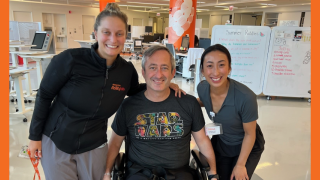Medical Resources
Body
These medical websites are great tools for learning about health, diseases, and treatments. The Centers for Disease Control and Prevention (CDC) and the Illinois Department of Public Health (IDPH) share important updates about staying safe and healthy in your community. If you're looking for trusted health facts, MedlinePlus and the Merck Manuals Professional Edition offer easy-to-read and detailed information. The National Institutes of Health (NIH) and PubMed are great places to explore medical research and studies.
For rare diseases, the Genetic and Rare Diseases Information Center (GARD) and National Organization for Rare Disorders (NORD) help patients and families understand their conditions. The Institute for Healthcare Improvement (IHI) works to make health care better for everyone, and the World Health Organization (WHO) shares global health news and safety tips. These resources are helpful for students, families, and professionals who want to learn more about health and medicine.
American Speech-Language-Hearing Association (ASHA) - Evidence-Based Practice (EBP)
The ASHA Evidence-Based Practice (EBP) portal provides clinicians with tools, tutorials, and systematic reviews to support informed decision-making in communication disorders by integrating clinical expertise, scientific evidence, and patient values.
The CDC shares trusted health information and updates about diseases, safety tips, and public health programs.
GARD gives easy-to-understand facts about rare and genetic diseases to help patients and families.
The Illinois Department of Public Health shares local health alerts, safety tips, and disease prevention info.
IHI works to make health care better and safer for everyone through research and training.
MedlinePlus offers simple and reliable health information on many topics for patients and families.
This manual gives detailed medical information for professionals, but it's also helpful for curious learners.
NIH is a major medical research center that shares discoveries and health tips with the public.
NORD helps people with rare diseases by offering support, education, and research updates.
PubMed is a huge library of medical studies and articles used by doctors, researchers, and students.
WHO helps people around the world stay healthy by sharing global health news and safety advice.
Medical Research Guidelines
Body
Offers tools and resources to help occupational therapy professionals apply the latest research and evidence in their practice. It supports knowledge translation to improve patient outcomes.
Provides easy access to clinical practice guidelines and medical summaries across specialties. Includes a mobile app for quick reference and updates.
Connects rehabilitation professionals with high-quality systematic reviews and evidence-based resources. Focuses on translating Cochrane evidence into clinical practice.
A searchable database of trustworthy clinical practice guidelines. Offers summaries and transparency scores to help users evaluate guideline quality.
Provides evidence-based resources and tools for healthcare professionals, including systematic reviews and implementation guides. Supports global health improvement through research translation.
Measurements and Data
Body
Lets users search and analyze public health data like births, deaths, and diseases.
Supports public health work through data, labs, and science tools.
Available through NU Galter Library. Includes surveys and tools used in health and social research.
Includes PROMIS, Neuro-QoL, ASCQ-Me, and NIH Toolbox to measure health and well-being.
Weekly CDC report with updates on diseases and health issues.
Shares U.S. health data to help researchers and policymakers.
National Bureau of Economic Research (NBER)
Free datasets for research in health and economics.
PEDro - Physiotherapy Evidence Database
Searchable database of physiotherapy research like trials and reviews.
Database of over 300 rehab tests with details on how to use them.
Search engine for clinical research, guidelines, and evidence.
U.S. Census Data
Provides U.S. population, housing, and economic data.



